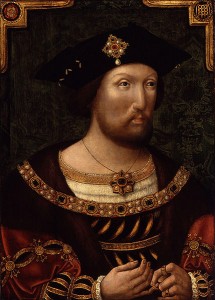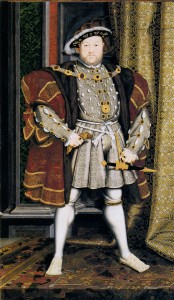When Henry VIII came to the throne in 1509 he was just shy of his 18th birthday. He was tall, robust, handsome and athletic. Yet when the infamous King died on 28th January 1547 he weighed about 178kg and had a waist measurement of 52 inches and a chest measurement of about 53 inches. So how did this decline in Henry VIII's physical appearance happen?
As a young man, Henry VIII was considered to be the most handsome prince in Europe. He was tall, standing at six foot two which was taller than the average man of the time. He was broad of shoulder, with strong muscular arms and legs, and had striking red/gold hair. It is said that rather than looking like his father, he resembled his grandfather the late Edward IV. In the armoury of the Tower of London is a suit of armour that Henry wore in 1514. The king's measurements show that he had a waist of 35 inches and a chest of 42 inches, confirming that Henry was a well-proportioned, well-built young man.
In 1519, when Henry VIII was just twenty-eight years of age, the Venetian Ambassador Sebastian Giustinian visited the English court. He had the honour of seeing Henry VIII and recorded that he was "extremely handsome; nature could not have done more for him. He had a beard which looks like gold and a complexion as delicate and far as a woman's" (Fraser, p. 66). He also stated that it was the "prettiest thing in the world to see the King playing tennis, his fair skin glowing through a shirt of the finest texture".
Henry was a passionate sportsman and had what seemed to be a never-ending flow of energy. He loved to be out-and-about and hated being bogged down by council meetings and paper work. That side of kingship Henry left to his right-hand man Cardinal Wolsey. Henry was passionate about hunting and it is said that he would wear out several horses in a single day of hunting! He also enjoyed a range of sports and pastimes, including tennis, wrestling, archery, masquerades, dancing and music. He was also extremely passionate about tilting and jousting, and was reported to be one of the best jousters in England. Jousting in itself is an extraordinary dangerous sport which required a great deal of physical strength, coordination, and skill.
Henry VIII also knew how to dress to impress. The King adorned himself in fine clothing and jewels appearing every the image of a magnificent King.
Over the years, Henry VIII suffered a series of illnesses and injuries which slowly changed him from athletic and robust to the overweight, bloated, tyrannical king that many recall today. Not even fine clothing and jewels could hide the physical weight and bodily troubles the King was suffering. Below is a list of the major injuries that Henry suffered throughout his life:
- Age 23: Catches Smallpox but recovers.
- Age 30: Catches Malaria, recovers but continues to suffer bouts throughout his life.
- Age 33: Jousting accident, forgets to put the visor down and his hit in the head above right eye with a lance (The Duke of Suffolk was Henry’s jousting partner) After this he suffers from terrible migraines.
- Age 36: Suffers a painful wrenched foot during a tennis match.
- Age 36: Varicose ulcers, caught by tight garters.
- Age 45: Jousting accident: Falls from horse, is squashed by the weight of his armour, the horse falling on him and the weight of his horses armour. He is unconscious for two hours. May have caused frontal lobe damage and seriously worsened the ulcers upon his legs.
- Later years: Starts to gain a great deal of weight, overeat, does not eat a balanced diet. Becomes obese and may have had type two diabetes and raised blood pressure.
One of the main conditions that Henry VIII suffered from was varicose ulcers. Over the years, the ulcers in Henry's legs grew worse. They were kept open and weeping, and were therefore constantly susceptible to infection, which could cause the ulcers to become very, very smelly. In 1536, Henry fell from his horse in a jousting accident and was unconscious for two hours. It is thought that he was crushed by the weight of his armour and horse, and that this pressure worsened the ulcers in his legs. His bad legs meant that he was increasingly unable to participate in exercise and sports. Towards the end of his life, Henry had to be carried about in a chair as the pain in his legs was simply too great. He started to binge eat and was often constipated and suffered from terrible mood swings.
In addition to his painful legs, in his later years Henry VIII ate around 5000 calories a day, which is twice what a sedentary man of his age requires by today's recommendations. Henry also ate all the wrong types of foods, including too much ale and red wine, far too much bread and meat, and not enough vegetables and fruits. Of course, in Tudor times they did not have the benefit of the same nutritional knowledge as we have today, but his diet would still be seen as lavish and excessive. Without the ability to participate in active sports and pastimes, these extra calories would not have been able to be burnt off and would have added weight to the King's mighty frame.It is also possible that due to his heavy weight, poor diet and lack of exercise, Henry VIII may have had very poor circulation. His heart would have grown very large and would have had to pump very hard to try to circulate the blood around his body. His liver would have become very fatty and he probably would have had high blood pressure and possibly type two diabetes. In his book Young Henry: The Rise of Henry VIII, Robert Hutchinson suggests that Henry VIII may have suffered from Cushing's Syndrome. This is a rare endocrine abnormality that causes increased weight to the torso and neck, weakening of the bones, and diabetes. In some rare cases, it can even cause mental issues such as paranoia and even impotence. Whether Henry suffered from this is inconclusive as his remains have not been examined or tested.
What is known is that it was a series of unfortunate accidents and the onset of worries and troubles that caused Henry VIII's slow decline in physical health. The varicose ulcers on his legs were one of the main reasons that the King could not participate as actively in hunting and sports as he used to. It is said in his later years instead of riding in the hunt the King would have deer herded towards him so he could stand and shoot. Even with his weight the King still managed to have fun! It is sad that for most of his life Henry VIII was a tall, handsome, athletic young man, the most handsome Prince in Europe, yet he is only remembered for the overweight, ill King that he became.
If you're interested in reading more on Henry VIII's health, keep an eye out for Kyra Kramer's book Henry VIII's Health: In a Nutshell which will be coming out very soon.
Sarah Bryson is the author of Mary Boleyn: In a Nutshell. She is a researcher, writer and educator who has a Bachelor of Early Childhood Education with Honours and currently works with children with disabilities. Sarah is passionate about Tudor history and has a deep interest in Mary Boleyn, Anne Boleyn, the reign of Henry VIII and the people of his court. Visiting England in 2009 furthered her passion and when she returned home she started a website, queentohistory.com, and Facebook page about Tudor history. Sarah lives in Australia, enjoys reading, writing, Tudor costume enactment and wishes to return to England one day. She is currently working on a biography of Charles Brandon, Duke of Suffolk.
Sources
- Fraser, Antonia (2002) The Six Wives of Henry VIII, Phoenix Press, London.
- Hutchinson, Robert (2011) Young Henry: The Rise of Henry VIII, Phoenix Press, London.
- “Inside The Body of Henry VIII” 2009, documentary presented by Robert Hutchinson, historian Dr Lucy Worsley and Dr Catherine Hood.
- Loades, David (2009) Henry VIII: Court, Church and Conflict, The National Archives, Surrey.
- Luminarium: Anthology of English Literature 2001, Henry VIII of England, 24 September 2015, Available from Internet http://www.luminarium.org/renlit/tudor.htm





Just like you I am particularly enamoured of this period of history, and have been since I was ten years old. I went to a school named Hardwick and lived in England until I moved to Australia. All my history books came with me!Now I live in California and fascinate my friends with stories from the Plantagenet, Tudor and Stuart times. Of course their interest is mostly peeked by the stories of the Tudor court. I was born of welsh parents , so that is part of love for the period.
Your articles are interesting and it is lovely to know that this time in history is still evoking so many questions.
Henry Viii like most men played fast and loose. Even when he spent the first 25 years of married life with Catherine of Aragon he was unfaithful to her with Ann Boleyn’s sister Mary Boleyn as well as the mother of Richard Fitzpatrick who it was said Henry almost named to the throne over his female offspring.
Ann held out for a crown but lost her head. Jane was a ninny. Anne of Cleave smartest of the bunch as was his last , Katherine Parr. The silly little air head Katherine Howard was a bit of fluff and soon came to a sad end. Divorced , beheaded, dead, divorced, beheaded, survived is how the ditty goes.
What evidence do you cite for Jane Seymour being a ninny? As far as I am aware there is no evidence that Jane was a ninny or uneducated or anything else that Anne Boleyn fans love to quote. Jane Seymour was conventionally educated, conventional in her beliefs and actions and a traditional Tudor woman. This does not make her a ninny. In fact like Anne of Cleves who is praised for her good sense in acceding to Henry’s requests and commands, it seems that Jane was probably more intelligent than she is given credit for. Yes she tried to intervene in the case of Mary and the rebels, but she had the common sense to back down. Katherine Howard was also portrayed as a ninny in the Tudors, but as books by Josephine Wilkinson and others show, this image is far from the truth. Our image of the Six Queens has been seriously distorted in a number of ways, with Anne Boleyn and Katherine Howard, the two beheaded Queens suffering the worst. Much work has been done to restore these six incredible ladies in recent years, with Anne Boleyn emerging as generous, socially responsible, well educated, astute, influential in the Reformation, rather than the witch, night crow of popular culture. A ninny suggests that Jane Seymour was empty headed or an idiot, but the evidence is that she was far from this.
Its well known that unlike Henry´s previous wives that were well eduacted, Jane was illiterate, not able to read or write, the only thing she could write was her own signature, if you look up her signature and compare it to the one of Katherine, it looks like a child wrote it. Jane was raised for house managment and needlework in which she was great in, her embroidery is really beautiful. The fact that she couldn´t write doesn´t make her a ninny, it just was not taken as that important in that time, but given her background and education she just did not get the chance to be that bright compared to other wives of Henry.
Lauren Mackay argues that Jane Seymour could read and write and could even understand French and Latin.
https://www.theanneboleynfiles.com/jane-seymour-redefining-the-myth/
Divorced, beheaded, DIED, divorced, beheaded, survived is how it goes. Otherwise there would be no rhyme.
“… like most men…” Truly intelligent people don’t make such generalizations and yet too many people still do it. I suppose it’s a decent time-stamp type marker for where to stop listening lest ye also be stricken down with the stupidity.
Katherine Howard was a “silly little airhead”? She was only 16 when her ambitious Norfolk family used her as a pawn in marriage to Henry to further their ambitions. She was seduced by a well-known pig famous for attacking young women. She may not have been too smart, but were you at 16? I don’t think I was. A little forgiveness and kindness would be acceptable for this unfortunate young woman. Not out-and-out dismissal. Good grief.
“Like most men”. Please stick to the facts of history rather than employing misandrist theories.
I believe Henry’s son was Henry Fitzroy, not Richard Fitzpatrick. There was a companion of Henry’s legitimate son, Edward VI, named Barnaby Fitzpatrick. Perhaps that’s where the confusion comes in. 😉
Thank you, Sarah, for your analysis of Henry VIII’s degenerating health. If we miss the importance of that we fail to understand both the man and the major events of the second half of his reign. In Henry the physiological, psychological and spiritual traumas of those years found their focus in his failure to fulfill his fundamental destiny of securing the dynasty (a dynasty established by usurpation back inn 1485). The athletic, macho, virile monarch became a sexually inept, semi-invalid. But, the bigger the problem, the more he lived in denial. He projected the lady-killer image – symbolized by the thrusting codpiece. He had to choose brides who aroused his passion. Any procreative failure he blamed on them. He was sensitive to the point of paranoia of any slight to his manhood – a factor in the downfall of Anne Boleyn, Cromwell and Catherine Howard and in the rejection of Anne of Cleves. The charade-role of ‘Randy Henry’ was so persistently performed (and, of course, sycophantically endorsed by his courtiers) that it has become part of the standard image ever since, The reality is that he believed in marriage, that he was not promiscuous by the standards of contemporary royal behaviour and that he sincerely believed in the divine calling of himself and his dynasty. Henry destroyed wives, ministers and faithful servants who crossed him but the real traitor was the king’s own failing body.
After reading the decline of Henry, I can see the human behind a King. I work on Vascular Ward and the pain Henry must have been under must have been horrendous . I have seen patients have a change of personality due to the pain and the smell is really really bad even if it’s not a hot day. I know that Henry had some really nasty accidents put even if he only had ulcers , without the proper medical Care and knowledge his life must have been miserable .
Did Henry VIII not have syphilis, also?
No. There is no contemporary evidence to support this idea as often shown by modern medical experts.
Henry was definitely a keen athlete but he went through the series of injuries that horsemen, hunting, tennis players, the joust, etc go through. Look at footballers and runners today. You have to keep fit but even the fittest and best can be injured. A leg breaking tackle can end a career. The fact that he recovered well, even though he got malaria every few years, which is typical even today, he recovered through his own strength. He continued to play tennis after he injured his foot, he continued to joust as he was probably an adrenaline junky and loved it, but was forced to give this up in 1536 and as you do, when you cannot exercise, he gained weight. Henry had ulcers which reopened, possibly unseen internal injury, frontal lobe damage, was in a lot of pain, he was depressed and his personality changed. We cannot be certain, but it is possible that he had other long term disabling conditions associated with extreme overweight. There is no evidence that he had syphilis or any other sexually transmitted disease. Thanks for your articles, very interesting and helpful. Cheers.
For all of his obvious faults, Henry provided a number of vital accomplishments for the British Empire.
He was the father of the British navy, demanding and acquiring the fleet that eventually owned the seas….and he produced Elizabeth whose rule solidified the Empire for centuries.
Let’s stop all the nonsense about how great this man was. He was a murderous monster that cut the head off an innocent queen so he could be rid of her, cut the head off of a young boy because he might grow up to challenge his rule, hanged thousands of innocent women and children to send a message to the north after their uprising and beheaded, maimed, butchered and burnt alive countless political and religious opponents. Like most “kings” he had no rules for himself while draconian rules for the rest of the people with incredibly harsh punishment for any infraction. To point to any of his accomplishments without listing the vast number of monstrous things would be no different than saying: look at all the great things Hitler did for Germany, wasn’t he a really great guy.
Sensato.
Well, we shouldn’t focus on only the negatives, either.
I concur with you completely.
Interesting that Henry is portrayed with garters below his knees. Wearing a tight garter would prevent some blood accumulating in varicose veins which would in turn enhance appearance of his lower legs. Tight stockings were also an important part of his style. These restrictive accoutrements could have led to deep vein thrombosis when considered with his known ulcerative lesions. Complicated skin infections are notoriously difficult to heal. Medieval medicine was primitive lacking in sterile technique and relied on cauterisation of wounds which itself is very painful and causes extensive scarring of wounds. There is also the possibility that he suffered a compound fracture of his femur, tibia and or fibula in his later jousting accident which may have contributed to his condition. Henry also suffered from gout which causes exquisitely painful joints usually in the foot and ankle. Taken together there is every reason to believe that Henry was in excruciating pain much of the time in his last decade. However this should not excuse his barbaric and sadomasochistic treatment of his family and associates.
There are hints in Bring out the Bodies that Anne B. was able to satisfy Henry’s cmplex sexual needs by the use of those ‘French methods’ of oral and anal sex that she had practised with her brother. Is this accepted? And if so are there not comparisons to be made with Edward VIII who was supposedly satisfied by Mrs Simpson’s expertise! Or are both these cases of ‘false news’?
Bring Up the Bodies is fictional and there is no evidence that Anne satisfied Henry in those ways or that she had anything other than a natural sibling relationship with her brother, George. Even Chapuys, who really didn’t like the Boleyns, said that the only evidence of incest was that they were in her chambers together.
Henry introduced the full meaning of Tyrant to the lexicon inside and far outside the borders of England. What a murderous narcissist and evil coward.
Frontal lobe damage may have led to personality changes, moodiness and impulsivity. Add to that the incredible pain Henry must have been in, it’s imaginable that he would easily ‘flip his lid’ and demand extreme punishments.
He is responsible for women giving birth laying down which is horrible. He enjoyed watching his wives and concubines suffer in delivery so did everything to prolong it. He was a horrible, objectifying guy.
It was Louis XIV of France, not Henry VIII of England, who made women lie down when giving birth. Louis didn’t do this because he enjoyed watching women suffer or to prolong the labor. He was just interested in the birth process and wanted to watch it.
I mean, yeah, Henry was pretty bad, but come on.
Wrong. That was Louis XIV of France.
This was very informational
This was very informational recommend for babies to read
After recently discussing Autobiography of HenryV111 by Margaret George at book club we had many speculations about Henry’s declining mental status. In the book Margaret mentions a green syrup the King was given for pain. Could he have been taking absinthe which would certainly cause hallucinations and mood swings. Also, reguarding the number of miscarriages and few live births no one mentions the possibilities of Rh differences – if the mother is Rh negative she may have one successful full term pregnancy, however will most likely develop Rh negative antigens which can cross the placenta and attack the fetus terminating the pregnancy. Mary Tudor may have inherited her mother’s negative Rh factor, therefore surviving. Of course there were any number of health impediments inherited or acquired back then.
Henry had a Kell positive blood type and it would explain the odd reproductive pattern of his partners. A Kell positive man can cause serious problems for his reproductive partners after the first pregnancy, because a Kell negative mother’s body will develop a Kell alloimmunization — which means that her body would attack a Kell positive fetus as “foreign” and the result is fetal or neonatal death. This could have been what happened when women had multiple pregnancies with the King. At least three of his children who survived infancy were the first children born to their mothers — and would have therefore been completely unaffected by Kell alloimmunization. Even if the first baby had gotten the Kell gene from Henry, the mother’s body wouldn’t attack it. However, any fetus conceived after the first baby which inherited the Kell gene from Henry would have been killed by the mother’s antibodies.
I’m a decent of King Henry VIII and would like to know if they found
that he had EDS. I heard he did when they excavated him.
It’s my grandmother’s side of the that I am related to the King.
My mother passed down EDS to me in return and my daughter was
Born with it . She then passed on to her 2 daughter’s and a grandson.
My Son and my daughter’s Son doesn’t have it.
I’m trying to find out who we got if from.
I would love to hear from you with any information you could give me.
How can you be descended from Henry V111 all his children died barren?
While not impossible, there is no evidence to suggest that Henry VIII has any living descendants. All of his legitimate children died childless, as did the one illegitimate child he acknowledged. There are many people that have been speculated to be his other illegitimate children, which is where these family stories probably come from, but none of this is confirmed. I would then say that it is very difficult to say conclusively whether or not your family got EDS from King Henry VIII. I would suggest doing research on more recent ancestors of yours.
I love this time in history also, but honestly, the man was a savage.
He had his wives murdered with no remorse.
He killed innocent beautiful animals for “fun”, as you write, and suffered from numerous ailments because of his ridiculous intake of meat and rich foods. In my opinion, he got what he deserved. Let’s not romanticise a deplorable human being, even if he was attractive and intelligent in his youth. He was a grotesque, narcissistic monster, who believed he was chosen by God.
Agreed! A complete narcissist as is Trump. Ugh.